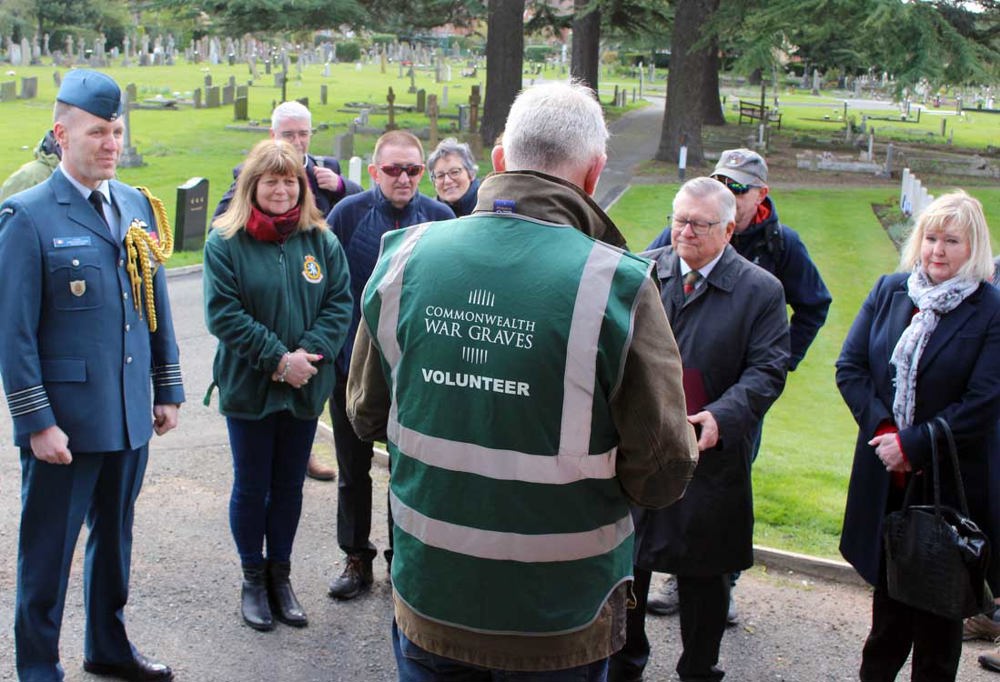Volunteering with Commonwealth War Graves
On this page you will find details of all of our current volunteering opportunities. Please remember that some of these roles are area specific so don’t be too disappointed if the one you’re interested in is not operating in your area at this time. There are always more opportunities coming up – so keep checking this page for updates.
If you are interested in one of the volunteering opportunities then simply open the link to find out more about it. The role profile provides an outline of the role and what you will be doing. You will be able to select multiple roles when you apply and you will be considered separately for each one.
Every application is carefully considered and you will be kept informed of its progress at every stage.
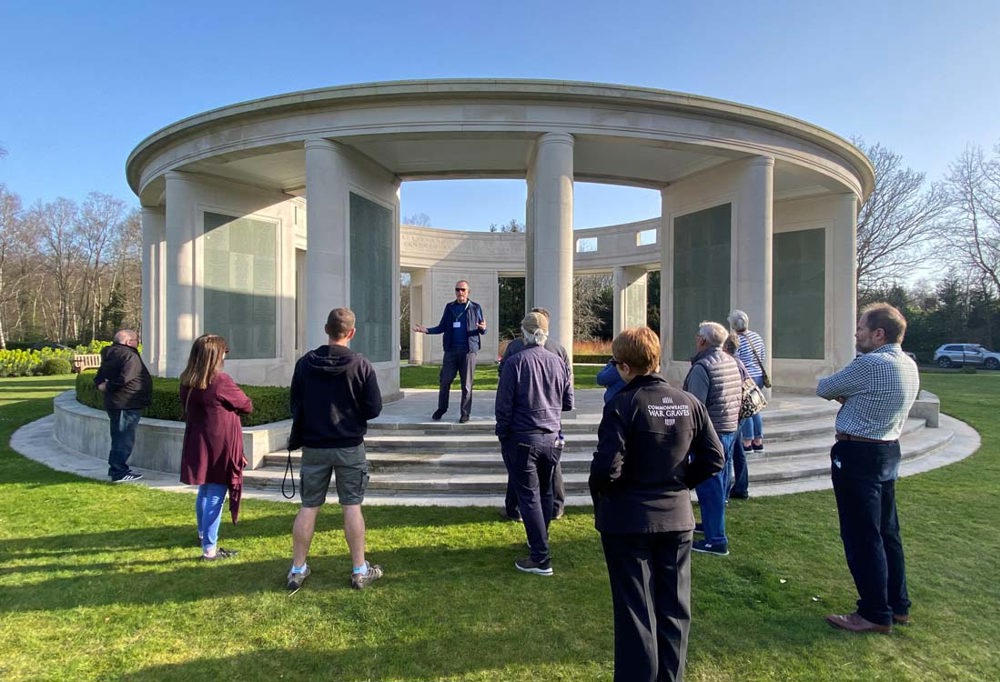
Volunteers event at Brookwood Military Cemetery.
Our current roles:
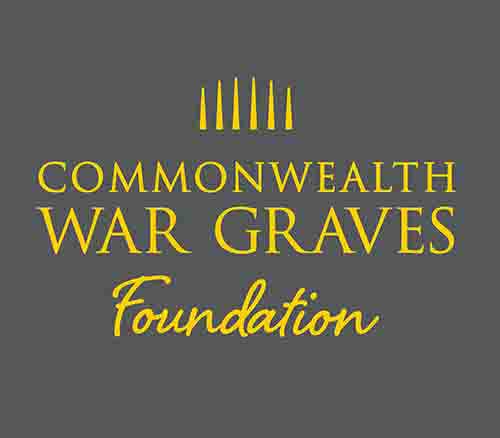 Foundation Admin Volunteer
Foundation Admin Volunteer
As a Foundation Office Admin Volunteer, you will provide in person support at our Head Office in Maidenhead. Working closely with our team, you will be responsible for the smooth running of our physical membership and donation mailouts. Due to this being an in-person role, please only apply if you are based in or around Maidenhead, Berkshire.
Click here for role description
Eyes On, Hands On
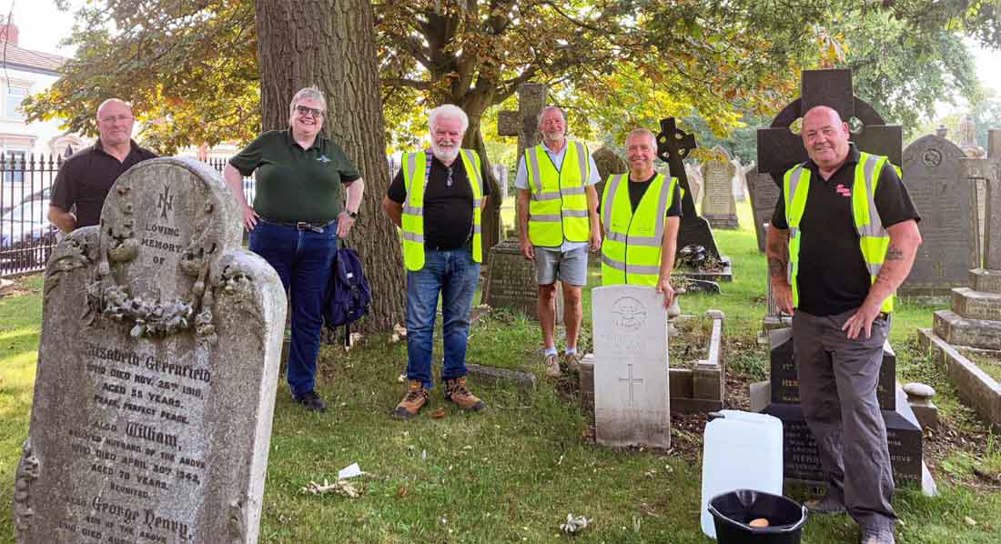
The EOHO project enables those with an interest in our work to act as our eyes in their local area. Volunteers feedback information about the condition of war graves so our resources are best directed to headstones that need our attention. Volunteers will be able to visit local war grave sites in their area, to conduct inspections and play a vital role in helping us to maintain UK war graves.
Project Description
There are thousands of war graves with CWGC headstones scattered throughout the UK, primarily in local churchyards. Many of these sites have a single or a small cluster of graves (we call these ‘scattered headstones’). Our Operations teams currently inspect these scattered headstones on a rolling basis every 2 to 5 years. The Eyes On Hands On (EOHO) project ensures that scattered headstones are inspected at least twice a year by volunteers, and the condition of the headstones, together with an image is reported and recorded. Where issues are reported, such as legibility of the inscription or damage, these will then be reviewed for action by our skilled Operations Teams. In addition, volunteers are trained to perform basic cleaning and clearing of the headstones. (We only clean headstones when necessary and according to our Cleanliness policy.)
About the Role
As part of the role, you will receive full training on how to inspect headstones, report issues and clean/clear headstones where required. You will be allocated specific cemeteries in your local area depending on your location and time commitment and be provided with information you require to locate and identify the headstones.
The role involves carrying out an inspection of the allocated graves, reporting back on their condition and carrying out a simple cleaning and tidying operation to help maintain the headstone in a satisfactory condition. The activity of our EOHO volunteers enables our highly skilled workmen to focus on the more complex headstone maintenance activities (such as re-engraving or stone repairs using specialist tools).
What are the primary tasks for the role?
What are the primary tasks for the role?
Tasks include:
- Visit your allocated local cemeteries at least twice a year and
- Complete an online site report documenting the condition of the headstones.
- Take initial photographs of each headstone and upload them to our digital systems.
- Take subsequent photographs as required.
- If necessary, clean the headstone using our approved methods (simply water and a scrubbing brush)
- If necessary, perform light clearing and weeding around the gravestone to maintain access.
What commitment will I need to make?
This will depend on how many cemeteries you are allocated – each site and its headstones require an inspection every 6 months as a minimum. Other ad-hoc visits may be required. Volunteers take on as many cemeteries as they feel able to look after (the minimum is one).
Thanks to the amazing response for recruiting Eyes On, Hands On volunteers we are now only recruiting in specific towns and areas. If you are interested in volunteering, please see the list below to find out which areas are actively recruiting.
PLEASE NOTE THAT DUE TO THE SUCCESS OF THE PROGRAM, WE ARE NOT CONSIDERING REQUESTS FOR ANY LOCATION NOT SHOWN.
| Our open regions | ||
| Cambridgeshire:Whittlesford | Surrey:Dorking | Highlands:Thurso |
| Channel Islands:Guernsey | Surrey:Oxted | Midlothian:Cockpen and Carrington |
| Cumbria:Barrow and Ulverston | Warwickshire | Midlothian:Dalkeith |
| Cumbria:Whitehaven | West Midlands:Birmingham Quinton | Midlothian:Lasswade & Loanhead |
| Cumbria:Workington Maryport & Cockermouth | West Midlands (Sandwell):Cradley Heath | Midlothian:Newbattle & Newton |
| Devon:Braunton | West Midlands (Sandwell):Smethwick | Mull |
| Devon:Okehampton | West Midlands:Wolverhampton | Shetland:Fair Isle |
| Devon:South Molton | West Yorkshire:Leeds Bradford | Shetland:Papa Stour |
| Gloucestershire:Forest of Dean | Argyll:Kielmahdoan/Ardgour | South Lanarkshire:High Blantyre |
| Greater Manchester:Bolton | Argyllshire:Ormsary | West Lothian:Uphall and Winchburgh |
| Greater Manchester:Oldham | Argyllshire:Tarbert | Anglesey:South |
| Greater Manchester:Salford | Argyllshire:Taynuilt | Carmarthenshire |
| Greater Manchester:Tameside | Dundee | Ceredigion |
| Hampshire:New Forest | Edinburgh:Kirkliston | Gwynedd:Caernarfon South |
| Hampshire:Southampton | Glasgow:Craigton | Gwynedd:Penygroes |
| Lancashire:Blackburn Preston & Chorley | Glasgow:Riddrie | Pembrokeshire |
| Lincolnshire:Barton upon Humber | Glasgow:Western Necropolis | Rhondda Cynon Taff |
| Shropshire:Bishops Castle / Craven Arms | Highlands:Achluachrach | Swansea |
| Staffordshire:Bentley | Highlands:Cromarty | |
| Staffordshire:Leek | Highlands:Kilmonivaig | |
The Speakers Programme
This programme aims to build a network of volunteers who will work alongside our Public Engagement Co-Ordinators and deliver a range of talks about the varied work of the CWGC, its history but also, importantly, its work today.
We are currently not taking applications for the speakers programme. Applications will re-open in June 2024.
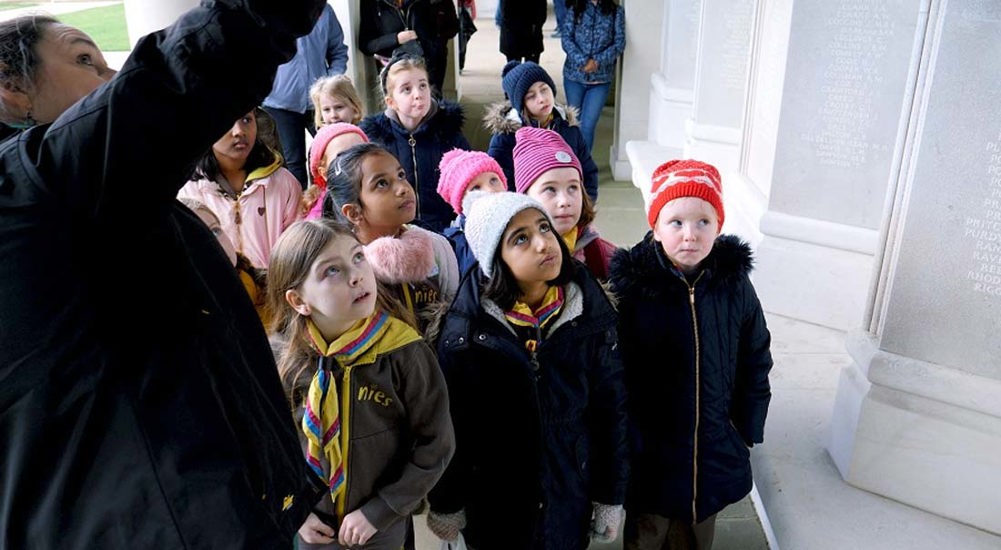
Speakers programme volunteers
Commonwealth War Graves Commission Volunteer Speaker (Organisations and Community Groups - Adults)
United Kingdom and Northern Area
Speakers Programme
Role Profile
Thank you for volunteering for the Project as a Volunteer Speaker (Organisations and Community Groups - Adults).
Project Description
The Commonwealth War Graves Foundation aims to create a UK wide network of trained volunteer speakers to deliver inspiring talks and workshops about the work and history of the CWGC and the story of our common sacrifice. These talks will be to companies, faith groups, rotary clubs and many other community groups. The CWGF Speaker Network will raise awareness of the work and history of the CWGC, it will educate and inspire the public to discover more about the history of the world wars and their communities through researching casualties local to them. It will also promote the work of CWGF and encourage people to learn more about membership or how donations enable us to continue our educational programme.
About the Role
As a CWGF Speaker you will be expected to;
- deliver a series of professional presentations about the history and work of the CWGC, about the war graves in your region, personal stories of servicemen and women, and information about the CWGF.
- deliver talks and workshops to commemorate key anniversaries (e.g. Remembrance Day, VE Day, D-Day, ANZAC Day etc). Your talks will be tailored to each particular audience but based on a template provided by the programme.
- inspire audiences to learn more about the CWGF and promote membership or donation so that our important educational work can continue.
You will be provided with a Speaker Toolkit by the CWGF into which you can insert a few of your own slides providing local context and stories, where this is appropriate and relevant. It is important to remember that as a Volunteer Speaker for the CWGC you are representing the views of the Commission, and not your own.
You will also be expected to support the CWGF by generating interest in these talks and encouraging communities to get more involved. Guidance and support for this role will be available through your regional PEC and the programme coordinator. You may also be asked to provide support to newly trained Speakers in your local area and help them to develop through an informal buddying process.
Project Volunteer Policy and CWGC’s Code of Conduct
The role is subject to the CWGC’s Volunteer Policy (which deals with issues such as Health and Safety, and Safeguarding) which will be sent out to you in due course and the CWGC’s Code of Conduct which is attached to this profile..
Tasks and Activity
- To work with the Regional Public Engagement Co-ordinator (PEC) in your area, to meet the requirements for speakers in organisations and community groups (adult groups only).
- To ensure all talks and workshops are booked through the CWGF booking system and PECs are kept informed of your schedule
- To keep up to date with CWGF key messages and ensure you regularly update your speaker resources through the CWGF online resources to ensure you deliver high quality, relevant and up to date talks or workshops
- To regularly attend speaker network training and follow our guidance
- To provide support to new speakers in your area and help them through an informal buddying system
- Fulfil the Commission’s Duty of Care towards members of the public
- Representing the Commonwealth War Graves Commission and the Commonwealth War Graves Foundation in accordance with the Commonwealth War Graves Commission’s Code of Conduct and Volunteer Policy
- Actively promote membership of the CWGF when giving talks, and collect membership enquiries where appropriate, following CWGC GDPR guidelines (training will be given).
- Wearing the volunteer uniform and badge, as given to you by the PEC, each time you deliver a talk or workshop but at no other time
Commitment
- To deliver a minimum of 5 talks or workshops per year within areas agreed with your PEC
- To commit to the time of a talk as requested by the host organisation
Skills and Experience required
- Proven experience of public speaking or talking to groups
- A friendly and outgoing manner
- Strong communication skills
- An interest in and understanding of the work of the CWGC
- A willingness to undertake mandatory core CWGC Volunteer training modules and mandatory training specific to this role
Key Skills
- You must have access to and be able to use a smart phone
- You must have basic IT skills which include
- being able to use and have access to the internet
- being able to send and receive emails
- being able to set up and deliver presentations using PowerPoint
Travel expenses are paid for this role but amounts must be agreed with the Speakers Programme Co-ordinator before each event.
We are delighted that you would like to become a CWGF Volunteer Speaker. Volunteers are an essential and appreciated part of our organisation. Please note that the way CWGC paid staff and volunteers relate to the public is governed by a Code of Conduct. This outlines the need to act with decorum and respect at any conventions associated with our sites. We have an experienced communications team who manage social media, queries from journalists and media organisations. Please ensure that should any such query arise you inform the Speakers Programme Co-ordinator as soon as possible.
CWGC Code of Conduct
Honouring the fallen of the two World Wars is a privilege, and places us all in a position of considerable sensitivity and trust. This Code of Conduct is intended to provide a framework for everyone involved with Commonwealth War Graves, at every level. It sets the expectations we have of everyone, and of how we all work together. It is aimed at protecting the reputation of the organisation, and ensuring our important task of commemoration is never jeopardised by our own actions.
Selflessness
Whilst it is recognised that they all have other responsibilities, Commissioners, trustees, volunteers and staff must declare any conflicts, and should act solely in the interests of the Commission and/or the Foundation as they carry out their roles.
Integrity
Commissioners, trustees, staff and volunteers must avoid placing themselves under any obligation to people or organisations that might try inappropriately to influence them in their work. They must not act or take decisions in order to gain financial or other material benefits for themselves, their family, or their friends, or for other organisations with which they are involved. They must declare and resolve any interests and relationships.
Objectivity
Commissioner, trustees and staff must act and take decisions impartially, fairly and on merit, using the best evidence and without discrimination or bias. Staff must use the Commission’s procurement processes or approved suppliers to ensure that there is transparency in our contracting.
Accountability
Commissioners, trustees and staff are accountable to the public, to regulators and to our member governments for their decisions and actions, and must submit themselves to the scrutiny necessary to ensure this. They must follow financial delegation schemes and all policies and procedures set down by the Commission.
Openness and honesty
Commissioners, trustees and staff should act in an open and transparent manner. Information should not be withheld from each other or from the public unless there are clear privacy or legal reasons for so doing. If they have concerns about the probity of any activity, they should raise them with a senior manager; the Commission has a whistleblowing policy to ensure anyone raising a concern is protected. Commissioners, trustees and staff should be truthful, and never withhold relevant information.
Authority and Empowerment
Every member of the organisation, from Commissioners to staff members, have job descriptions or terms of reference. They must at all times act within them, and not exceed their authority or their delegated power or budget without approval.
Representation
Unless designated as a spokesperson for the Commission, Commissioners, Trustees, staff or volunteers should not engage with media organisations or journalists without the approval of the Head of Communications. Social media use should be caveated that the views expressed are those of the individual, and not of the organisation; only authorised team members should respond on behalf of the Commission to social media approaches. Anyone asked to represent the Commission at an event should act with decorum and respect the conventions of the occasion.
Behaviours and values
The Commission has clearly articulated values of respect, excellence, teamwork, communication, professionalism and commitment, each of which has associated behaviours. We want the Commission to be a happy, productive and inspiring place to work for all. Bullying, harassment and discrimination of any kind will not be tolerated, and our policies on these must be respected. We should all acknowledge good behaviour and challenge and feel confident about reporting poor behaviour. Commissioners, Trustees and staff and volunteers must do nothing that could bring the Commission into disrepute.
Safety and safeguarding
Commissioners, Trustees, volunteers and staff all commit to operating safely. They will follow the Commission’s risk assessment and health and safety at work policies and processes and ensure they are aware of the safety of themselves and others at all times. They also commit to safeguarding young and vulnerable people.
Commonwealth War Graves Commission Volunteer Speaker (Schools & Youth Organisations)
United Kingdom and Northern Area
Speakers Programme
Thank you for volunteering for the Project as a Volunteer Speaker (Schools & Youth Organisations).
Project Description
The Commonwealth War Graves Foundation aims to create a UK-wide network of trained volunteer speakers to deliver inspiring talks and workshops about the work and history of the CWGC and the story of our common sacrifice. These talks will be to schools, colleges, companies, faith groups, rotary clubs, scout/guide groups and many other community groups. The CWGF Speakers Network will raise awareness of the work and history of the CWGC, it will educate and inspire young people and other groups to discover more about the history of the world wars and the role of their community, through researching casualties local to them. It will also promote the work of CWGF and encourage people to learn more about membership or how donations enable us to continue our educational programme.
About the Role
As a CWGF Speaker you will be expected to;
- deliver a series of professional presentations about the history and work of the CWGC, about the war graves in your region, personal stories of servicemen and women, and information about the CWGF.
- deliver talks and workshops to celebrate key anniversaries (e.g. Remembrance Day, VE Day, D-Day, ANZAC Day etc). Your talks will be tailored to each particular audience but based on a template provided by the Education Team at CWGC.
You will be provided with a Speaker Toolkit by the CWGF into which you can insert a few of your own slides providing local context and stories, where this is appropriate and relevant. It is important to remember that as a Volunteer Speaker for the CWGC you are representing the views of the Commission, and not your own.
You will also be expected to support the CWGF by generating interest in these talks and encouraging communities to get more involved. Guidance and support for this role will be available through your regional PEC and the programme coordinator. You may also be asked to provide support to newly trained Speakers in your local area and help them to develop through an informal buddying process.
Project Volunteer Guidance and CWGC’s Code of Conduct
The role is subject to the CWGC’s Volunteer Policy (which deals with issues such as Health and Safety, and Safeguarding) which will be sent out to you in due course and the CWGC’s Code of Conduct which is attached to this profile..
You will also be expected to work to the Terms and Conditions of the Commission’s Lone Working Policy.
Tasks and Activity
- To work with the Regional Public Engagement Co-ordinator (PEC) in your area, to meet the requirements for speakers in schools and youth organisations.
- To ensure all talks and workshops are booked through the CWGF booking system and PECs are kept informed of your schedule
- To keep up to date with CWGF key messages and ensure you regularly update your speaker resources through the CWGF online resources to ensure you deliver high quality, relevant and up to date talks or workshops
- To regularly attend speaker network training and follow our guidance
- To provide support to new speakers in your area and help them through an informal buddying system
- Fulfil the Commission’s Duty of Care towards members of the public
- Representing the Commonwealth War Graves Commission and the Commonwealth War Graves Foundation in accordance with the Commonwealth War Graves Commission’s Code of Conduct and project guidelines
- Wearing the volunteer uniform and badge, as given to you by the PEC, each time you deliver a talk or workshop but at no other time
Commitment
- To deliver a minimum of 5 talks or workshops per year within areas agreed with your PEC
- To commit to the time of a talk as requested by the host organisation
Skills and Experience required
- Proven experience of working or volunteering with young people
- Proven experience of public speaking or talking to groups
- A friendly and outgoing manner
- Strong communication skills
- An interest in and understanding of the work of the CWGC
- A willingness to undertake core mandatory CWGC Volunteer training modules and mandatory training specific to this role
- You must be willing to undertake a DBS clearance
Key Skills
- You must have access to and be able to use a smart phone
- You must have basic IT skills which include
- being able to use and have access to the internet
- being able to send and receive emails
- being able to set up and delivery presentations using PowerPoint
We are delighted that you would like to become a CWGF Volunteer Speaker. Volunteers are an essential and appreciated part of our organisation. Please note that the way CWGC paid staff and volunteers relate to the public is governed by a Code of Conduct. This outlines the need to act with decorum and respect any conventions associated with our sites. We have an experienced communications team who manage social media, queries from journalists and media organisations. Please ensure that should any such query arise you inform the Speakers Programme Co-ordinator as soon as possible.
CWGC Code of Conduct
Honouring the fallen of the two World Wars is a privilege, and places us all in a position of considerable sensitivity and trust. This Code of Conduct is intended to provide a framework for everyone involved with Commonwealth War Graves, at every level. It sets the expectations we have of everyone, and of how we all work together. It is aimed at protecting the reputation of the organisation, and ensuring our important task of commemoration is never jeopardised by our own actions.
Selflessness
Whilst it is recognised that they all have other responsibilities, Commissioners, trustees, volunteers and staff must declare any conflicts, and should act solely in the interests of the Commission and/or the Foundation as they carry out their roles.
Integrity
Commissioners, trustees, staff and volunteers must avoid placing themselves under any obligation to people or organisations that might try inappropriately to influence them in their work. They must not act or take decisions in order to gain financial or other material benefits for themselves, their family, or their friends, or for other organisations with which they are involved. They must declare and resolve any interests and relationships.
Objectivity
Commissioner, trustees and staff must act and take decisions impartially, fairly and on merit, using the best evidence and without discrimination or bias. Staff must use the Commission’s procurement processes or approved suppliers to ensure that there is transparency in our contracting.
Accountability
Commissioners, trustees and staff are accountable to the public, to regulators and to our member governments for their decisions and actions, and must submit themselves to the scrutiny necessary to ensure this. They must follow financial delegation schemes and all policies and procedures set down by the Commission.
Openness and honesty
Commissioners, trustees and staff should act in an open and transparent manner. Information should not be withheld from each other or from the public unless there are clear privacy or legal reasons for so doing. If they have concerns about the probity of any activity, they should raise them with a senior manager; the Commission has a whistleblowing policy to ensure anyone raising a concern is protected. Commissioners, trustees and staff should be truthful, and never withhold relevant information.
Authority and Empowerment
Every member of the organisation, from Commissioners to staff members, have job descriptions or terms of reference. They must at all times act within them, and not exceed their authority or their delegated power or budget without approval.
Representation
Unless designated as a spokesperson for the Commission, Commissioners, Trustees, staff or volunteers should not engage with media organisations or journalists without the approval of the Head of Communications. Social media use should be caveated that the views expressed are those of the individual, and not of the organisation; only authorised team members should respond on behalf of the Commission to social media approaches. Anyone asked to represent the Commission at an event should act with decorum and respect the conventions of the occasion.
Behaviours and values
The Commission has clearly articulated values of respect, excellence, teamwork, communication, professionalism and commitment, each of which has associated behaviours. We want the Commission to be a happy, productive and inspiring place to work for all. Bullying, harassment and discrimination of any kind will not be tolerated, and our policies on these must be respected. We should all acknowledge good behaviour and challenge and feel confident about reporting poor behaviour. Commissioners, Trustees and staff and volunteers must do nothing that could bring the Commission into disrepute.
Safety and safeguarding
Commissioners, Trustees, volunteers and staff all commit to operating safely. They will follow the Commission’s risk assessment and health and safety at work policies and processes and ensure they are aware of the safety of themselves and others at all times. They also commit to safeguarding young and vulnerable people.
How do I apply?
Please read through your chosen role, our Volunteer Strategy and Volunteer Policy to familiarise yourself with the position and what we will be asking of you. Then, use the button below to access our Volunteer Signup portal and register you interest in a role. A member of our team will then be in touch with you to further discuss your application.
Our volunteer strategy and policies cover everything you need to know about volunteering with us, our commitments, expectations and an overview of our volunteer roles.



